Nestled beneath the Hutto-Patterson Gym on the Pasadena City College campus, lies the equipment room.
Huddled in between a workout room and the athletic training department, two equipment managers spend eight hours, and often more, of their day washing uniforms, muddying footballs and managing inventory for the 16 different teams the college has to offer.
Behind it all, they’re fighting for the recognition they feel they deserve, with the intention of presenting their terms to the California Community College Athletic Association, or CCCAA, leading to changes within their department and more.
“We’re different from a 9 to 5,” 41-year-old athletic equipment attendant Erick Valadez said. “I don’t know if the college thinks it’s important…we have to cut back because they have to save money. Who’s they? Every time I ask, nobody says who ‘they’ is, but I would love to know who ‘they’ is. If working overtime is such a big deal, how come nobody has come down here to see what we do?”
In the athletics department, the equipment managers are responsible for attending to the equipment of all the sports at the school. Within the NCAA, equipment managing departments can be massive, some even dedicated to just the football program.
Just in Southern California, community colleges like Chaffey College, East Los Angeles College and Glendale Community College have just one or two equipment managers on-site.
PCC is one of the few schools to have two, something Valadez is looking to change. He added the athletic training department has the freedom to work more hours, without the hassle and restrictions of navigating overtime pay.
“That’s why you gotta get in there and approach the state,” he said from his desk, littered with everything from files, a miniature helmet and his 2021 CCCAA SoCal Bowl championship ring.
“You get what you want so people can start taking you seriously,” he said. “If it’s about money, athletics needs more.”
Humble Beginnings
Growing up in Highland Park, Valadez is the son of a Peruvian mother, who moved to Los Angeles in 1972, working in the garment district downtown for 30 years.
His father worked at Dolly Madison, an American bakery brand owned by Hostess Brands, and then, for the Los Angeles Metro.
Valadez mentioned the support of his parents were paramount, a time where Highland Park’s hip, booming subculture was absent and was muddled by violence and distractions. He credits great mentors in his life for keeping him on the right path.
“Sports played a big role in my life,” Valadez said. “We didn’t get to see the bad stuff that happened around us…I remember in junior high attending friends’ funerals. That’s tough to see as a young kid.”
Valadez, the youngest of five, played football at Franklin High School and later earned an associate degree from ELAC. He spent 15 years of his life coaching at schools like Bell, Wilson, eventually returning to Franklin, where it all began.
Reinforcements
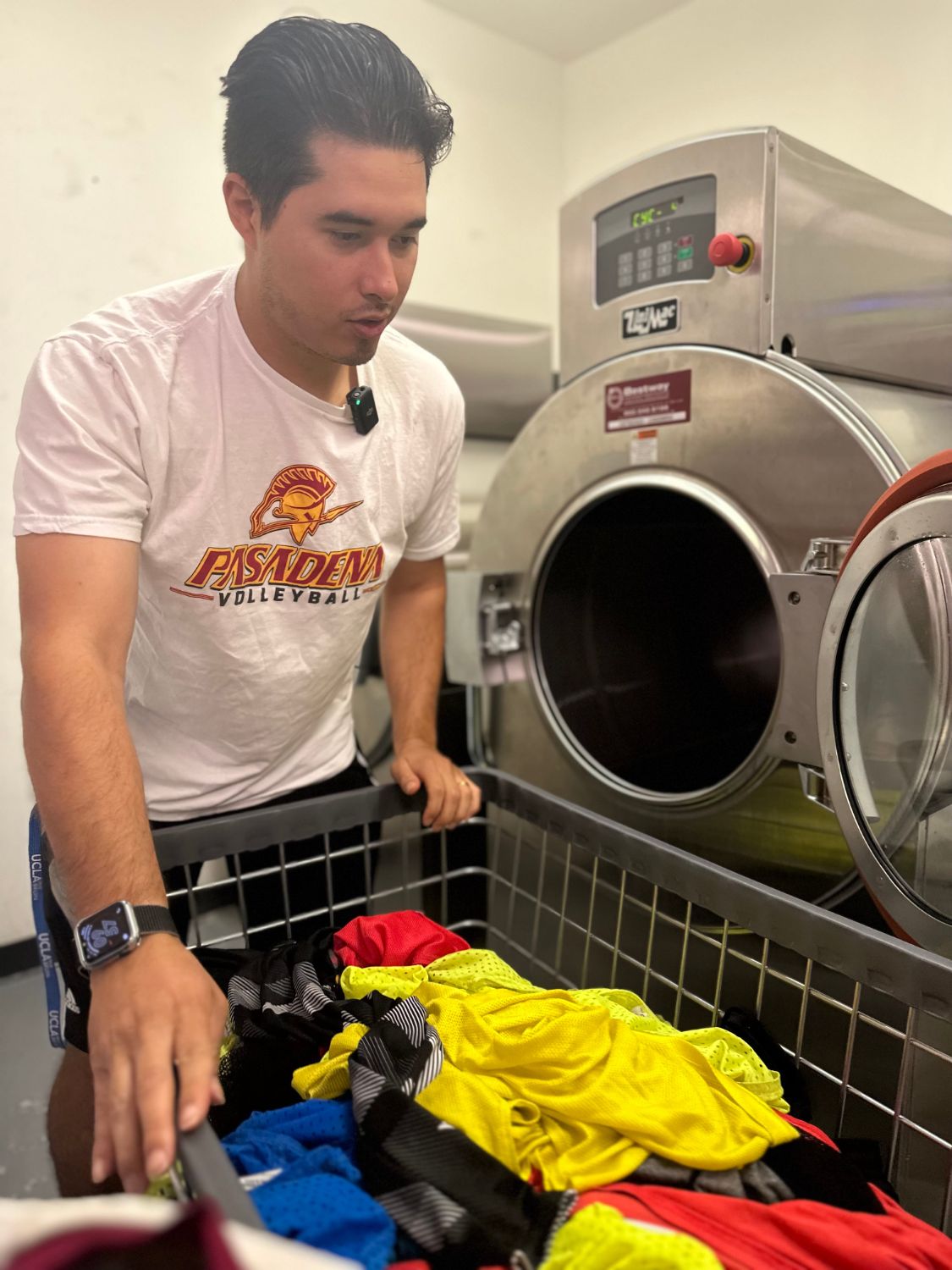
In almost a seemingly fitting pairing, 33-year-old Ryan Cardona was hired part-time during the pandemic using funds granted to the school by the CARES Act. Now, he’s been a full-time employee for about a year.
Cardona grew up in Alhambra, attending Franklin and comes from a storied legacy there. His father worked at the school for 30 years and was well respected.
“My parents taught me to work hard,” Cardona said.
In elementary school, Cardona fell in love with history reading a World War II book. Later, he began studying at ELAC, transferring to UCLA earning a bachelor’s degree in history. A year later, he decided to pursue a master’s in history, graduating in 2017 from Cal State University Los Angeles.
When he was in the sixth grade, he and his family were on a trip to Arizona in 2002. The only thing he remembers is waking up in the morning. After that, it’s all dark.
“I woke up on a stretcher,” Cardona said. “It’s been an interesting experience trying to figure out what was the cause.”
Cardona has been living with epilepsy since. As of now, he takes a regulated dose of Keppra and is unsure if this is something he will be taking for the rest of life, living seizure-free since the incident.
Wedged in the middle of two siblings, an older brother and an older sister, his older brother would come to his aid in school when the other kids would tease him. In that time, watching sports and cartoons channeled an escape from the sadness and disappointment he felt from his diagnosis.
Cardona admitted it’s something he’s moved on from, attributing it to love and support from his family.
“My family really helped,” Cardona said, crediting his mother for being the anchor in the family.
Now, Cardona lives with his wife and soon-to-be 11-month-old son, born on Veteran’s Day last year. While long, Cardona’s wife understands the time commitment dedicated to his work, sometimes away for long hours on a weekend and working just 10 months out of the year.
Home Base
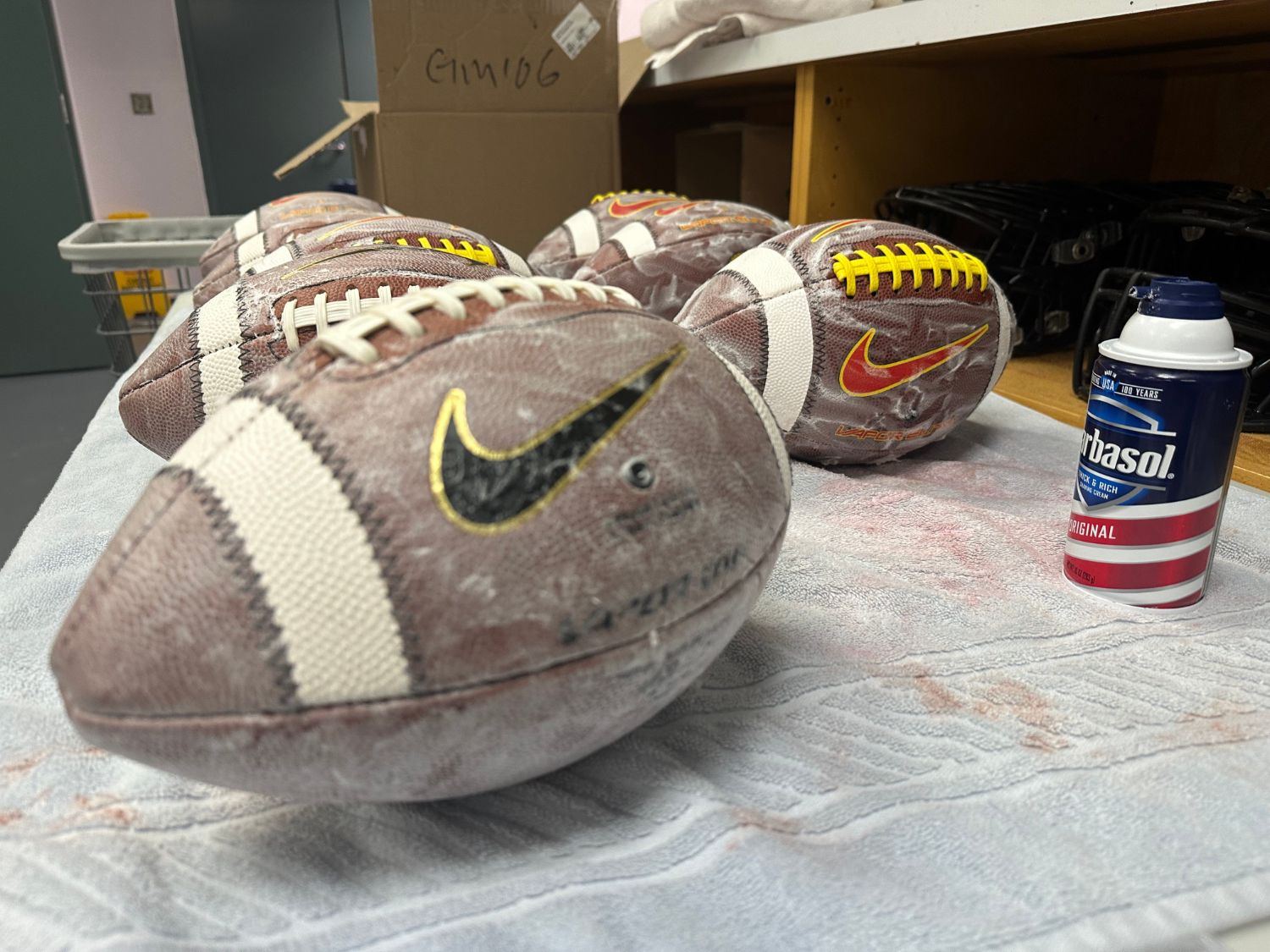
The noise traveled across the fluorescent-lit basement, where Valadez and Cardona sat at their desks, tucked behind two glass windows and white walls. Boxes littered the room as a new shipment of yoga mats came in. Every half hour or so, a beep sounded, signaling to the team a new load is ready to make the 3-foot journey from the washing machine to the massive, 7-foot-tall dryer next to it, the life blood of their operation.
“Unless we’ve got a game going on,” Valadez said. “I’m here the majority of the day washing stuff.”
The four, $5000 cleaning systems rumbled in the background, sloshing around fabrics made by the likes of Nike and other brands.
The relatively new, UniMac industrial washer and dryer crank out dozens of loads of laundry a day, supplying the student athletes with fresh uniforms and practice gear.
Of the 16 teams, football is the most grueling, Valadez added, attending to requests, maintenance and other duties for the dozens of players on the roster.
Answering The Call
For 19-year-old sophomore linebacker, Michael Prappas, the equipment room was his first introduction into college football, starting in the summer of last year when the team was gearing up for the summer.
A product of San Marino High School, Prappas was awarded the 2021 Earl Bruce Titan Player of the Game, given to the player of the game in the annual matchup against Temple City.
When his college career began, he went down to the equipment room to pick up his gear.
Hesitant, Prappas said he wasn’t sure if they’d have everything he would need. The reality was, they had even more.
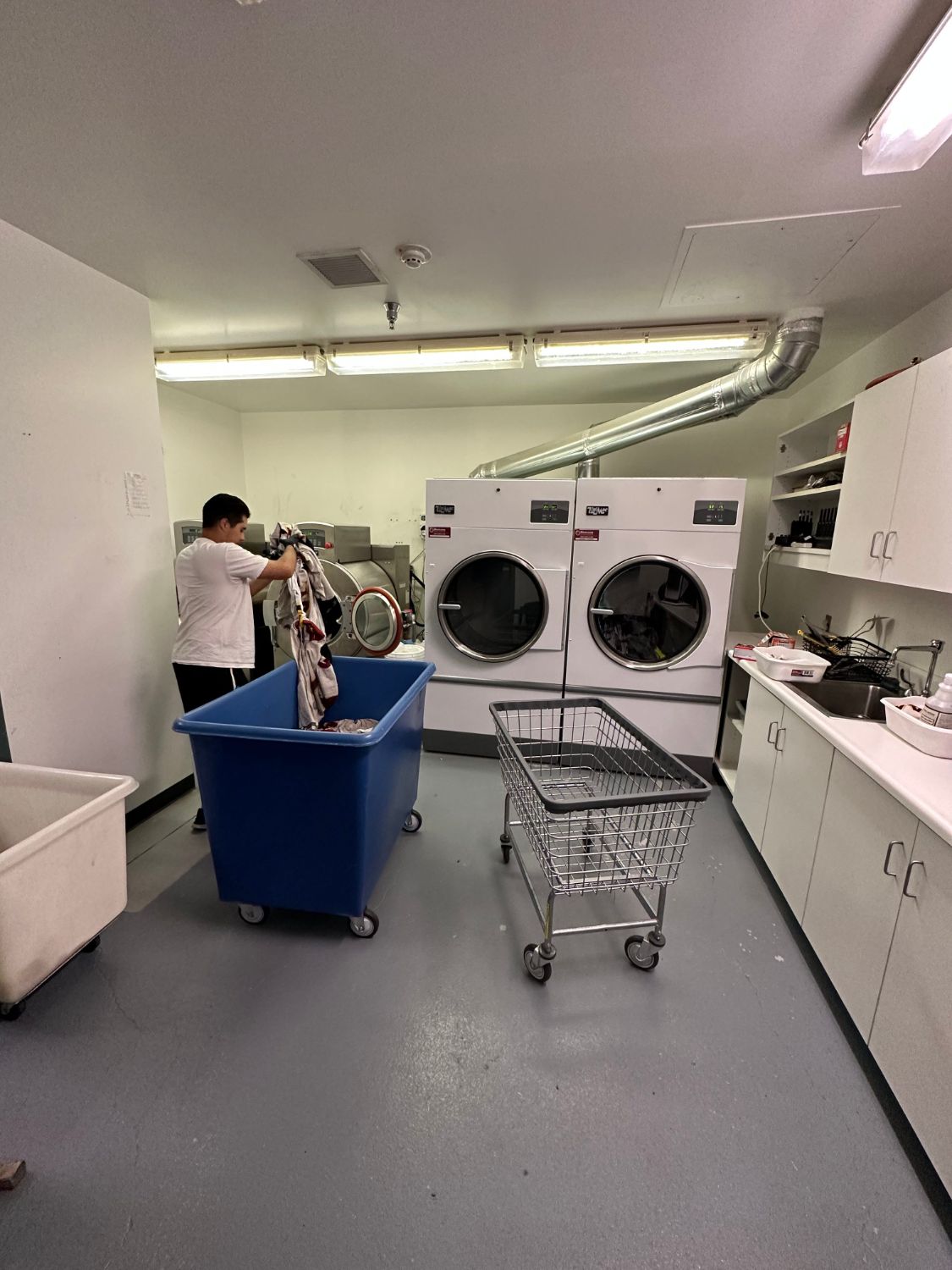
“I had arrived in college football,” Prappas said. “They made it really easy for us.”
Prappas added that both Valadez and Cardona make sure each player has exactly what they need, preparing travel bags when the team goes on the road to face opponents across the region.
The players show up, and they can just get on the bus, a full-service most teams don’t get at the community college level and for Prappas, the friendship is something he values just as much.
“They do everything,” Prappas said. “The fact is I can go in there and say what’s up and ask how their day was and they remember my name…they build connections with everyone on all the teams and that’s pretty amazing.”
Even through all of the work both Valadez and Cardona do, Prappas said he understands the need for more help in the equipment room.
“I would say they do need some help,” he said. “It’s not because they don’t do a great job. It’s for their quality of life because they work really long hours because of it.”
The Institution
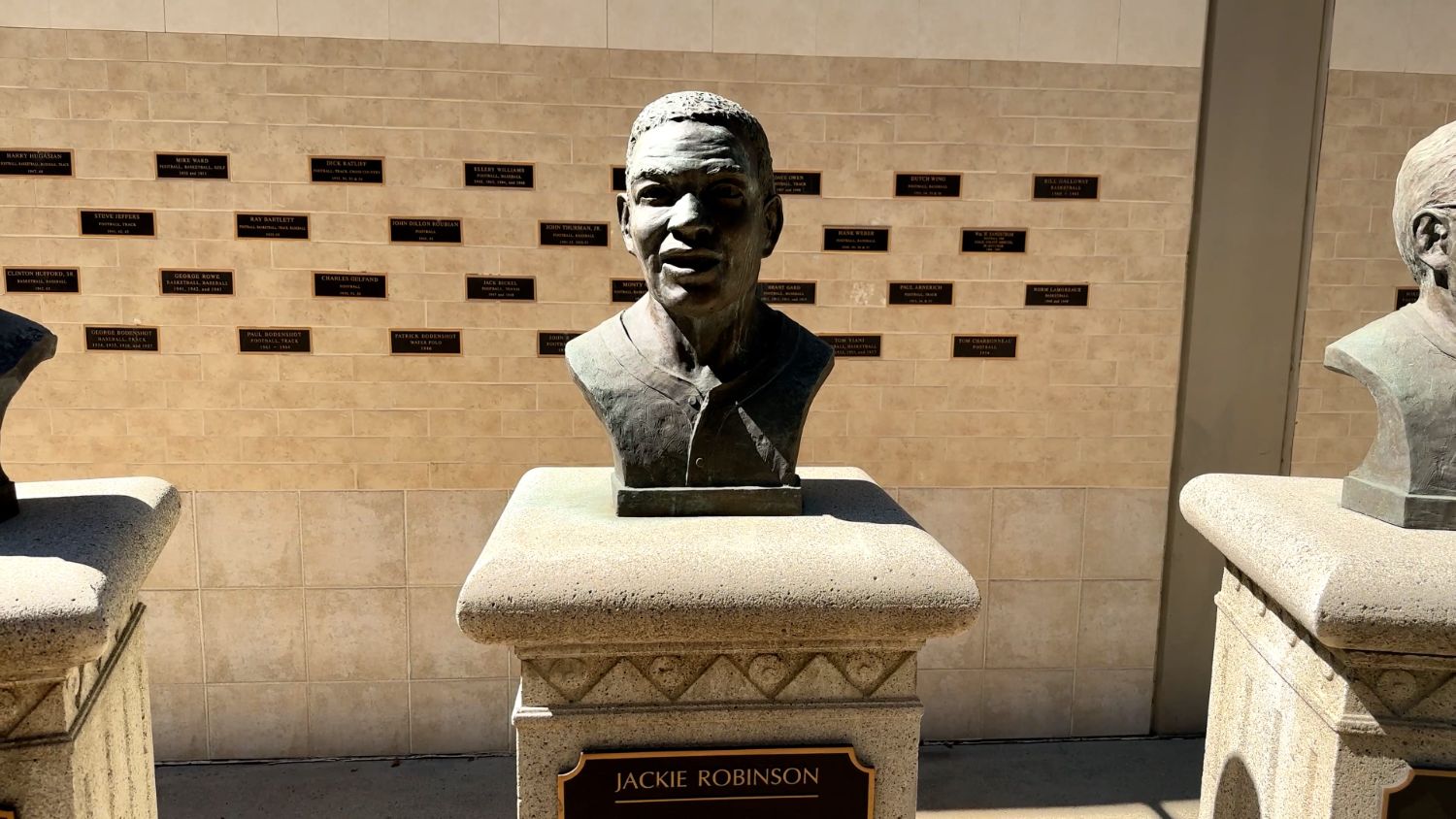
Valadez and Cardona emphasize it’s not just about washing clothes. It’s about the hundreds of student athletes who rely on them to keep them safe. Representing a storied PCC legacy dating back to big names like five-time NBA champion and Laker legend Michael Cooper, and Jackie Robinson, a product of John Muir High School who later broke Major League Baseball’s color barrier.
Combined, Valadez and Cardona handle the school’s 16 teams, across 11 sports, often working more than the eight hours a day they’re allowed to work, helping steer PCC to one of the best community college athletics programs in the state.
“If we’re going to be a staple of the state,” Valadez said. “We are going to have to be supported a little bit more. We are not asking for unlimited funds…we have been stuck in this little room for 20 years, how about we add something to it.”
Higher Rank
Alex Boekelheide is a strategic communications & marketing executive and the special assistant to the superintendent at Pasadena City College.
Boekelheide spoke to the needs of the college across all departments, stressing the importance of a thorough review process. He added there’s a dean assigned to multiple departments, including athletics.
“The college executes a pretty comprehensive planning process,” he said. “We look at needs across the entire institution and all of the deans are part of that process.”
The Numbers
Just this year, PCC released its annual budget, earning over $177 million of revenue in 2022-2023. Yet, there are only on average about 1 to 2 equipment managers scattered across community college athletic departments in California.
Simply, Valadez and Cardona stressed it’s not enough, and are pushing for more help. Not only do they both wash the hundreds of uniforms, socks and practice gear for the sports, they manage an inventory for every athlete, monitoring eligibility and coordinating with the dozens of coaches at the school.
The “Loop” system is monitored on every garment, assigned to each athlete. Much like a VIN number on a car, the clothes are dropped off at the equipment room, processed through their inventory system, and handled accordingly.
Valadez mentioned the inventory system, while helpful, can be painfully slow, stymying the efficiency of the equipment room’s dynamic duo, leading to his aspirations to organize with the help of the Athletic Equipment Managers Association, or “AEMA.”
Rallying The Troops
In 2020, Valadez and several others started with just one meeting a year, where equipment managers from Southern California community colleges would meet virtually on Martin Luther King Jr. Day to discuss equipment management in a scarce, and unprecedented, time.
What started as an annual meeting, morphed into a collaborative trade system so the athletes could continue to compete, navigating scarce supply chain issues where companies like Riddell, the makers of athletic equipment, didn’t have the components needed to maintain the equipment daily.
“It turned into a group for us to vent about what was going on during the pandemic,” Valadez said. “We were trying to figure out how we were going to do it…everybody helped out one another which is something you don’t usually see.”
Through these meetings, it garnered the attention of the AMEA making waves amongst the community and Valadez, along with several others from the region, are planning to take a trip to the 2024 AEMA Convention in Atlanta.
“We have to keep this going,” Valadez said. “We have to get some respect. We’re starting to put things together to get a voice.”
The Fight
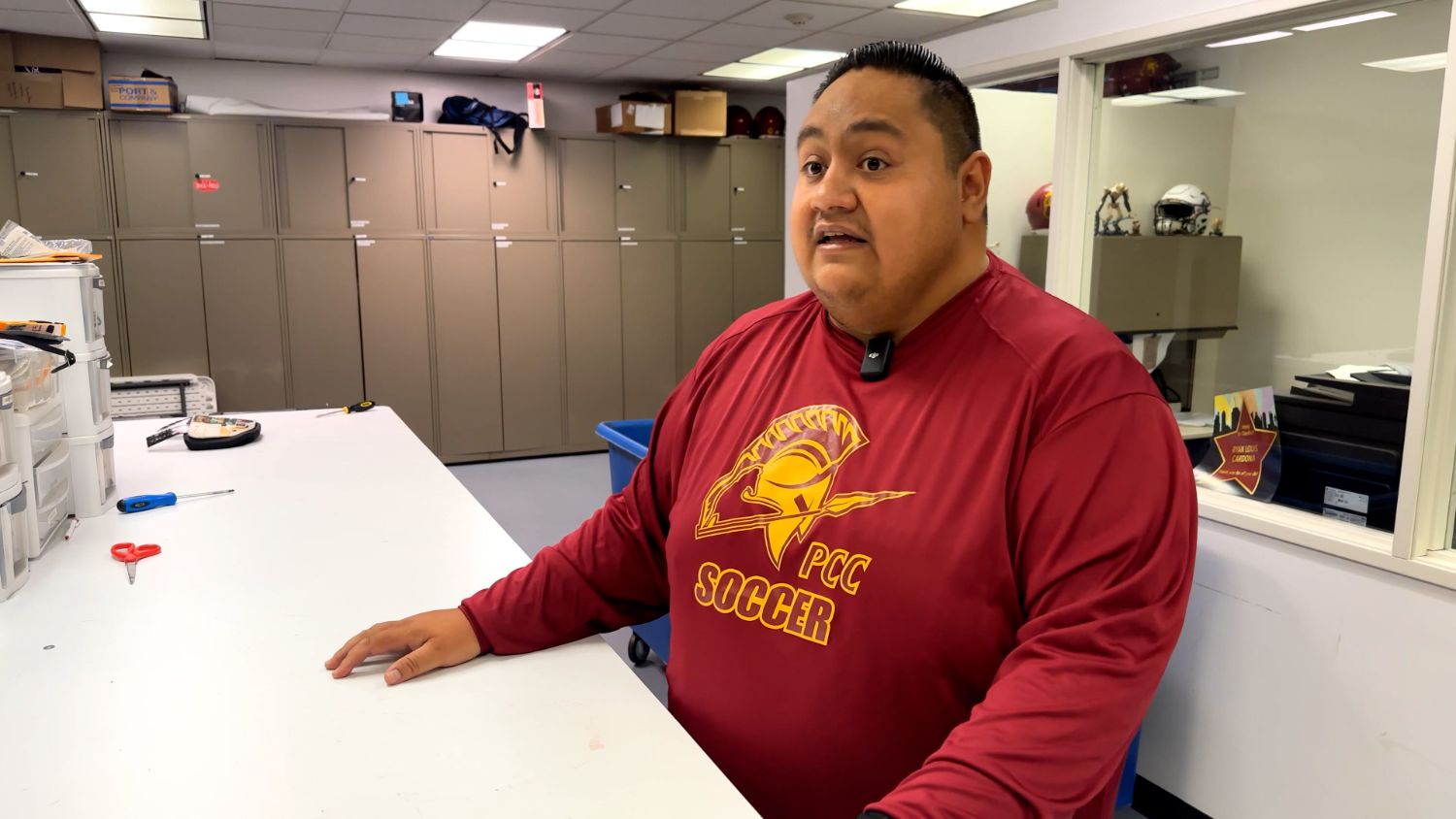
When Cardona was hired full-time for this position, nobody at the college could tell him why he could only work 10 months out of the year, putting pressure on Valadez, a 12-month employee, when Cardona is away.
Meaning, Cardona goes without an income for two months, an issue Valadez believes is worth fighting for along with more access to overtime hours, or even another member to join their team.
“I never understood the 10-month versus 12-month,” Valadez said. “I never got it. Sports are year-round. You need two people here every time…give us a reason. Are we hurting that bad? Nobody told us anything.”
In the past, there have been attempts to extend Ryan’s position, only to hear a “no” from the college without any explanation or reasoning behind it, something PCC athletic director Jackie Johnson hopes to solve.
“Ryan [Cardona’s] position needs more months,” she said.
Johnson has been the athletic director for over a year now. New to the institution, she held a prior position at Evergreen Valley College and lives in Lakeview Terrace. She’s the acting supervisor to both Valadez and Cardona, ensuring the needs of the department are met.
She remembers the first day she met Valadez and immediately knew how valuable he was to the college, highlighting his work ethic and commitment to the department. In her brief time with PCC, she hopes to continue to take the necessary steps to extend Cardona’s position during her tenure.
Between Johnson, Valadez and Cardona, neither of them knows why the university structured the position in its current capacity or how long it’s been structured in that way.
As of now, Johnson mentioned she’s unsure where the process currently stands and would like to see their department committed to helping the hundreds of student athletes at the college.
“That’s my answer,” she concluded.
The Why
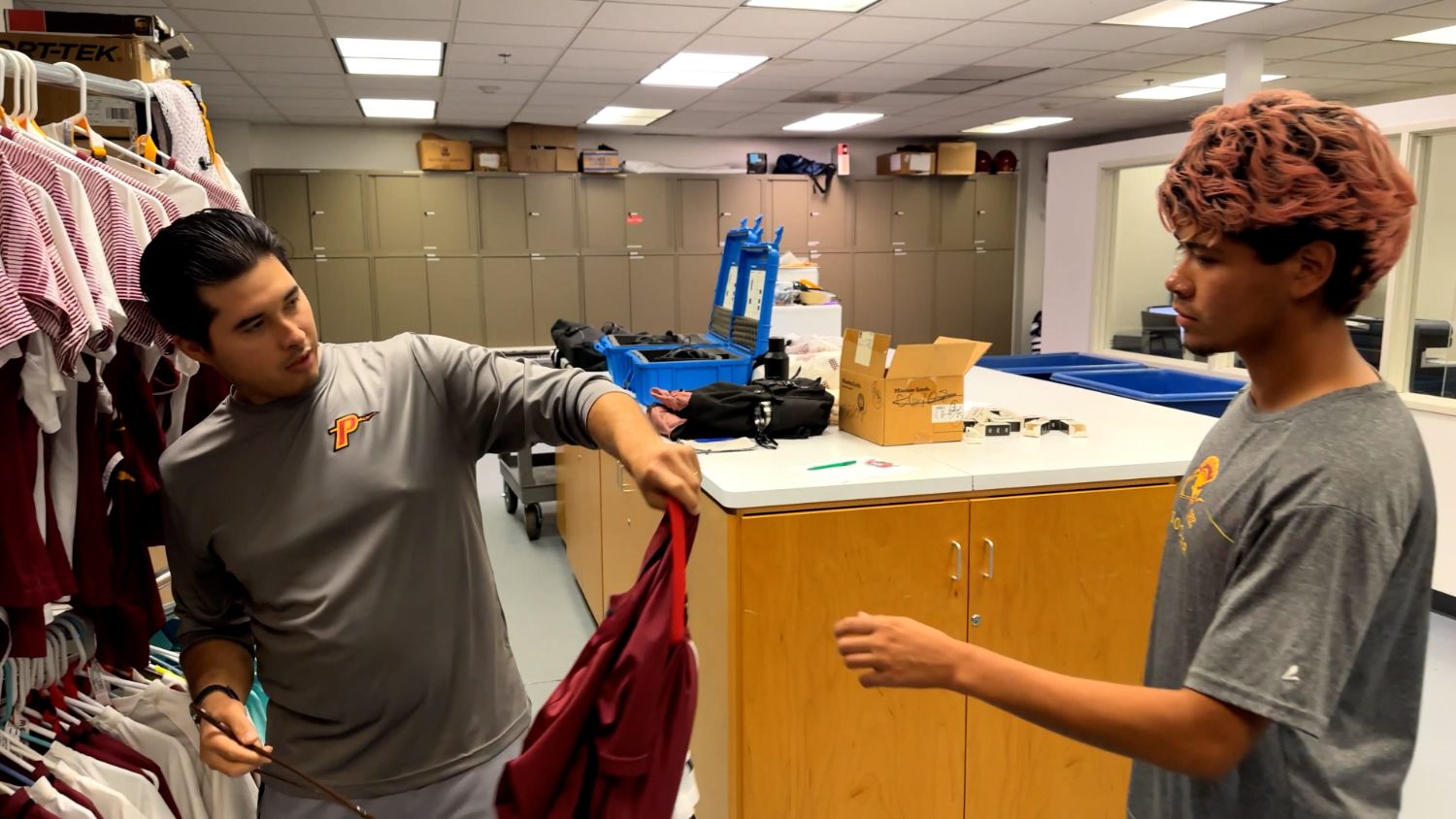
Across several community colleges in the region, equipment managers like Valadez and Cardona’s commitment to the athletes is the penultimate goal, shaping the young careers of the players who move on to four-year universities.
Valadez said “his door is always open” to students who have come and gone. As it’s known, most students stay at the college for two years prior to transferring to chase their goals of being the next star in the NBA, MLB or the NFL.
Michael Wyche, who Valadez encountered during his time at East LA College, transferred to the University of Miami, later playing for the Green Bay Packers, the formula for every junior college athlete’s dream route to stardom.
Only Wyche’s journey was troubled. He was homeless for part of his childhood, losing his mother to cancer and currently his father is serving a 40-year prison sentence. In 2015, Wyche was arrested on a misdemeanor domestic violence battery charge.
Yet, despite this, he’s committed his life to empowering youth and he authored a new book entitled, “Grief Through His Eyes Volume 2,” a story “spreading the message of hope and resilience,” according to an Instagram post on his website.
Valadez just received a call from Wyche, letting him know he’d be getting a copy.
“It’s awesome to see that,” Valadez said. “Sometimes people don’t really know. They see the good athlete, but they don’t know the story behind it. Some of these stories are heartbreaking but when you see them graduate from college and become a better person in life…this door will always be open.”
















.png)










